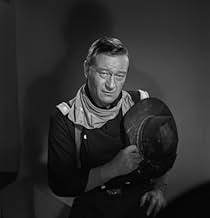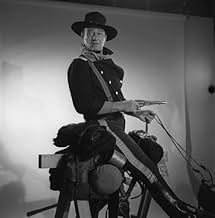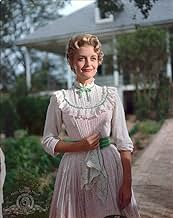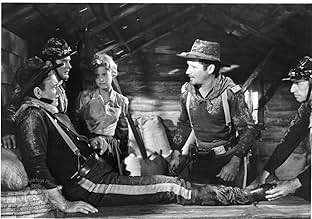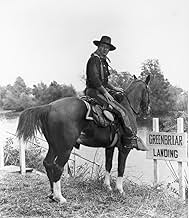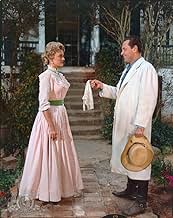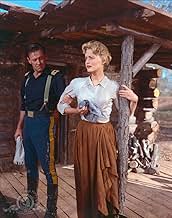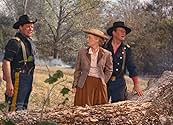Adicionar um enredo no seu idiomaIn 1863, a Union outfit is sent behind Confederate lines in Mississippi to destroy enemy railroads but a captive southern belle and the unit's doctor cause frictions within ranks.In 1863, a Union outfit is sent behind Confederate lines in Mississippi to destroy enemy railroads but a captive southern belle and the unit's doctor cause frictions within ranks.In 1863, a Union outfit is sent behind Confederate lines in Mississippi to destroy enemy railroads but a captive southern belle and the unit's doctor cause frictions within ranks.
- Direção
- Roteiristas
- Artistas
- Prêmios
- 1 indicação no total
- Direção
- Roteiristas
- Elenco e equipe completos
- Produção, bilheteria e muito mais no IMDbPro
Avaliações em destaque
John Ford always disparaged the films he made after Wings of Eagles, but in my opinion, The Horse Soldiers is one of his finest films. Also in my humble opinion he managed to get one of John Wayne's finest film performances. Wayne's a volunteer officer, in civilian life he rose from section hand on a railroad to an construction engineer. Holden calls him "section hand" as a term of derision after Wayne consistently refers to him as "croker."
Wayne and Holden were very close personal friends and friendly rivals at the box office. That's part of the reason that The Horse Soldiers is so good, the chemistry between them. In fact when Wayne died in 1979, Holden was said to have gone on one legendary drinking binge. Who would have suspected we'd have lost him as well two years later.
Holden as the doctor has a less flamboyant part than Wayne, but he makes the most of what he was given. I suspect knowing the relationship between Wayne and John Ford, he knew going in his part would be less, but he did it anyway.
Anyone who thinks John Wayne incapable of acting should see the scene in the saloon at Newton's Station after the Union forces repel a Confederate attack and are about their business destroying the railroad property. In a great drunk scene he reveals to Constance Towers the reason for his hatred of the medical profession. I won't reveal it, but it's something we can all understand. Wayne did this scene so well that Ford used an abbreviated version of it in The Man Who Shot Liberty Valance.
Ford makes marvelous use of music in there, weaving traditional Civil War era songs with the song written by Stan Jones for the film, I Left My Love. That is one catchy and infectious ballad, one of the best things written for a John Ford movie. Incidentally Stan Jones makes a brief appearance in the film as Ulysses S. Grant and does well by him.
There are two in the supporting cast that deserve mention. During the Civil War Lincoln had to deal with volunteer political generals, most of whom were a flop. Willis Bouchey playing John Wayne's co-commander in the expedition captures the phenomenon to perfection. He's argumentative, arrogant, and a general pain in the butt to Wayne. It's probably Bouchey's finest screen performance.
And Carleton Young also gives what I think is his finest screen performance as the one armed Confederate colonel who tries in vain to stop Wayne from completing his plans. It's a role that requires dignity and strength and Carleton Young is marvelous. In fact the contrast between Bouchey and Young as soldiers is pretty obvious.
The relationship between the Section Hand and The Croker evolves during the running time of The Horse Soldiers. It's a relationship well worth seeing develop.
Col. John Marlowe (John Wayne) is assigned to take a small brigade of cavalry from Tennessee, ride hundreds of miles into the Confederate territory and destroy the railroad at Newton Station, Mississippi, thereby cutting the supply line to Vicksburg... To do it, he will have to avoid all contact with rebel forces until he has reached his target...
The first problem Marlowe encounters is Major Hank Kendall (William Holden), an obstinate surgeon who will be accompanying the force... Marlowe has the expected contempt of the combat soldier for his colleague who carries no arms... In addition, when Kendall asserts his rights as an officer in the medical corps to declare unfit any soldier he considers so, Marlowe and Kendall clash...
The next problem is Marlowe's second in command, Col. Secord (Willis Bouchey), who makes no secret of his plans to use his military career to further his strong political ambitions...
The third problem is the high-spirited belle Hannah Hunter (Constance Towers). This violent Southern patriot gives him an initial hard time... The Yankee soldiers stay at her plantation soon after they cross into the Confederacy... When Hannah learns their plans, Marlow is forced then to take her along with them for security reasons...
Holden and Wayne (violently opposing strong personalities) perform their assignment with a consummate force, intensity, and expert teamwork... Constance Towers, too, registers a vital presence... At their first dinner, she passes Wayne a platter of chicken... As she leans over, threatening to divulge her engaging décolletage, she says: 'Oh come now, Colonel, a man with a great big frame like yours can't just nibble away like a little titmouse. Now what was your preference, the leg or the breast?'
Incorrigibly sentimental and romantic in his big cavalry epic, Ford's motion picture is full of heroic cavalry on the skyline imagery... Among the more affecting scenes is that in which a harsh compassionate Wayne comforts a dying young soldier and the one in which he registers his love for Towers... There is also a compelling sequence, pure John Ford, in which a group of teenage cadets march out from a Southern military academy to take on the enemy, which makes manifest to battle boys and pulls a retreat, leaving the kids cheering...
Historical inaccuracy aside though the movie did quite well. The film showed multiple viewpoints and a fair degree of respect for most of them. It showed aspects of the war that were generally ignored in other films of the period -- the bloody horror of battlefield amputations, the desire of people to give up on the whole thing (I can't think of an earlier film that talked about deserters and the way they disrupted the southern home front), and the pain of the sheer physical destruction of the war -- a pain that affected the destroyers as well as the victims, something Gone With the Wind never quite admitted.
Some posters have complained about southern belle Hannah Hunter's overuse of sex appeal to spy on Union soldiers -- while there was no historical Hannah Hunter there were plenty of southern women who did just that, including Belle Boyd, Rose Greenhow and others. Some posters have complained about the way the film trivializes slavery -- this is unfair. It underplays slavery but never trivializes it. It shows conflicts within the Union army about the institution and addresses the issue of personal loyalty between some slaves and masters without glamorizing the institution as a whole. Does the film go far enough by modern standards? No. But it goes much farther than its contemporary and treats the slavery issue more honestly than modern travesties like Gods And Generals.
One poster actually complained about how inaccurate southern snipers were -- this is completely unfair. There was no indication that the "snipers" were specially trained men with Whitworth rifles or anything like that. They looked more like ordinary troopers out skirmishing, or perhaps the even more poorly trained militia. Ordinary soldiers fired more than 100 rounds for every hit they scored, so poor shooting on either side is nothing to be surprised about.
8 out of 10
Você sabia?
- CuriosidadesThe film marked the beginning of mega-deals for Hollywood stars. John Wayne and William Holden received $775,000 each, plus 20% of the overall profits, an unheard-of sum for that time. The final contract involved six companies and numbered twice the pages of the movie's script. The film, however, was a financial failure, with no profits to be shared in the end.
- Erros de gravaçãoIn the shot right after Hank Worden throws the torch onto the cotton bales, look at the upper left of the screen. You will see an airplane flying from right to left.
- Citações
Miss Hannah Hunter: [bending over with a plate of chicken, revealing ample cleavage] Do you prefer the leg... or the breast?
Col. John Marlowe: I've had quite enough of both, thank you.
- ConexõesFeatured in Dirigido por John Ford (1971)
- Trilhas sonorasI Left My Love
by Stan Jones
Principais escolhas
- How long is The Horse Soldiers?Fornecido pela Alexa
Detalhes
- Data de lançamento
- País de origem
- Idioma
- Também conhecido como
- Marcha de valientes
- Locações de filme
- Empresas de produção
- Consulte mais créditos da empresa na IMDbPro
Bilheteria
- Faturamento bruto nos EUA e Canadá
- US$ 1.753.526
- Tempo de duração
- 2 h(120 min)


